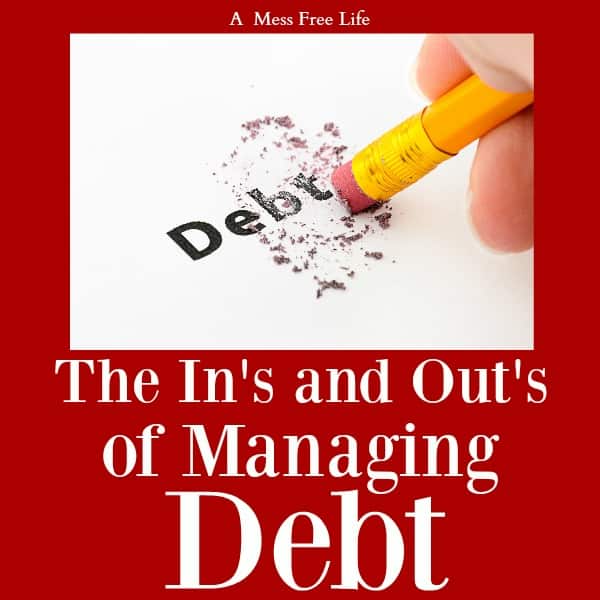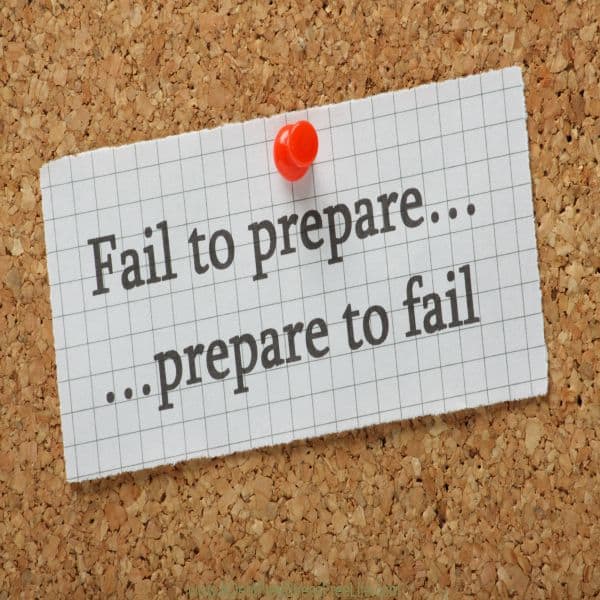A Mess Free Life may collect a share of sales or other compensation from the links on this page.
Too many Americans are in debt.
If you’re wondering it’s 80%. 8 out of 10 American’s are in debt with the average household’s credit card debt with a balance of $15,654. Households with any kind of debt owe $131,431 (including mortgages), on average.
Most end up in debt without thinking about what they are doing. They are on autopilot – spending recklessly or endlessly trying to keep up with the Joneses. In the end, they end up with more debt than they are comfortable with. They have pushed past their comfort zone and headed into dangerous territory.
Does this sound like you?
If so, there is something you can do about it.
In my series How To Love Your Money, we’re exploring all money options. All the things you need to do to be well-informed and take really good care of your money.
We’ve already covered, Saving Smart, Developing A Spending Plan, Managing Your Debit Cards and Using Pre-Paid Cards. Today we’re going to explore managing debt.
Table of Contents
THE INS AND OUTS OF MANAGING DEBT
When you get on the path of becoming debt free, it requires a lot of work and one of the things you must learn to do is manage your debt until the day comes where you’re debt has been eliminated.
The first thing you want to understand is what is your personal debt comfort zone.
It used to be said that student loan debt and a mortgage were acceptable forms of debt. Just ask the millions of young adults carrying around thousands of dollars of student loan debt how acceptable it is today, and you might get a different response.
I read story after story of people struggling to pay student loan debt, and many say they would do it very differently if they had fully understood the debt load they were taking on.
What about the second acceptable form of debt – mortgages? Some people have no problem having a 30 or 40-year mortgage while others, myself included, work tirelessly to pay off our homes. For me, the security of owning my home outright is high on the list of things that are important to me.
Then, of course, there is car loans and credit card debt, unnecessary for almost everyone.
I make a car payment because I love the dependability of a new car. It’s directly related to my childhood and seeing the stress caused by car repairs my father couldn’t afford to pay. I don’t carry credit card debt at all and find it the biggest stressor and waste of money out there.
In a nutshell, I’ve shared with you my personal debt comfort zone. I don’t mind a car payment (I lease due to getting a great business write off from it) I want to own my house outright, and I don’t have credit card debt.
What’s your debt comfort zone? Only you can decide.
Your debt comfort zone may change depending on where you are in your life. It’s especially important to take responsibility for our money as we face life events like: sending the kids to college; retirement; caregiving for elderly loved ones and spouses; and changes in our health and abilities.
No one wants to be retired and buried in debt. I know I don’t, so I understand how important it is at my age to be careful with my money.
Taking charge of your finances means less worry and anxiety.
HERE’S WHAT YOU NEED TO KNOW ABOUT MANAGING DEBT

ADMIT THE PROBLEM
If you’re deep in debt, the first step is to admit you’ve got a debt problem. It’s an important first step in tackling the problem. Here are some warning signs you’re in financial trouble:
- Next month’s bills are here before you’ve had a chance to pay last month’s
- You’re frustrated by the amount you owe because it’s more than you thought it was
- You’re no stranger to past due/shut-off notices
- You avoid opening bills and letters and hate to answer the phone
- You don’t know how much money you have in your account
- You don’t track your spending
WRITE IT DOWN
Do you know how much debt you have? Most people don’t. You need to make a list of everything you owe. Include it all whether it be the mortgage, credit card, student loan or cable bill. Include the following information:
- The lender name
- The amount you owe
- The term of the loan
- The interest rate and fees
Then total them up. The numbers will probably make you worry, but you’ve already made a positive step. You’re no longer in the dark about what you owe and to whom.
SET A GOAL
Reducing debt is like losing weight. You’re not going to lose 50 pounds in a month. You need a realistic goal in a reasonable time frame. The average person takes four to five years to become debt free. Aiming for three years isn’t too long or short of a time frame. The idea is to set the goal now.
CUT SPENDING
Unless you win the lottery or decide to take another job, the only way to save money is to stop spending it. Cutting spending is the fastest way to reduce the debt load. It’s literally like taking a surgical stab at your finances.
HEAL YOUR RELATIONSHIP WITH MONEY
Once you head down the path to paying off your debt, you’re free to start looking at all the ways you used money in an unhealthy way. You can evaluate what emotions and feelings triggered your spending. It will help you to ensure you don’t get into debt again in the future.
Without doing this step you run the risk (and a high risk at that) of getting into debt again.
Until we have the clarity to understand why we used money in a way that got us into trouble, it’s really easy to find ourselves back where we started and in debt again.
How many times have you paid off debt just to find yourself in debt again?
PROMISE NOT TO SPEND
Put your credit cards away or better yet, cut them up! Adding to your debt load will keep you in the cycle of debt. Your three-year goal will be meaningless. If you buy a new camera and put it on a credit card, and take three years to pay if off, the money you “saved” won’t matter. When you feel inclined to buy, just walk out of the store or get up from the computer when the purchase doesn’t fit your budget. Make a promise to yourself you’ll stop spending money.
BRING IN MORE MONEY
If you can reduce spending, you can also bring in more money. Think about creative ways to retain your income — consider a part-time job doing something you’d enjoy. Or think about making additional money out of a hobby — market craft talents, cooking skills or home-improvement abilities.
GET HELP
If you’re in over your head and having a hard time making changes, get help. The National Foundation for Credit Counseling
(www.nfcc.org) offers information on financial and consumer topics. Their member agencies can help with:
- Reviewing income
- Setting up a realistic personal budget
- Negotiating with creditors to arrange reduced payments on bills
- Planning for future expenses
You can learn to manage debt successfully. I did it and I am confident, given the right tools, you can too.
I’m always here to help. If you have questions about your personal debt situation, you can contact me directly at maureen@adebtfreestressfreelife.com.
I answer all debt related emails that come to me.




